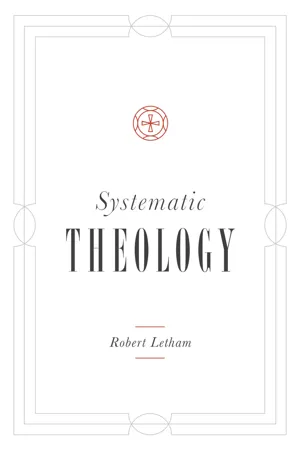
- English
- ePUB (mobile friendly)
- Available on iOS & Android
Systematic Theology
About this book
This comprehensive systematic theology by respected theologian Robert Letham covers the whole field of Reformed Christian doctrine from biblical, historical, and theological angles.
Letham begins with God's ultimate selfrevelation as the Father, the Son, and the Holy Spirit in indivisible union, continuing on with the works of God in creation, providence, and grace. He draws deeply from Scripture and important voices from the church to provide a clear and concise articulation of the Reformed faith. He also addresses current issues such as feminism, charismatic gifts, sexual ethics, environmentalism, other religions, the nature of truth, and civil liberties. Each chapter is followed by discussion questions, with a glossary of terms included at the end.
This work grounds theological understanding and practice in the life and ministry of the church, accessible to pastors, students, scholars, and anyone who desires to understand, believe, and live scriptural doctrine more fully.
Tools to learn more effectively

Saving Books

Keyword Search

Annotating Text

Listen to it instead
Information


Table of contents
- Cover
- Newsletter Signup
- Endorsements
- Title Page
- Copyright
- Dedication
- Contents
- Acknowledgments
- Permissions
- Abbreviations
- Introduction
- Part 1 The Triune God
- 1 The Revelation of God
- 2 The Trinity (1)
- 3 The Trinity (2)
- 4 The Trinity (3)
- 5 The Attributes of God
- Part 2 The Word of God
- 6 The Doctrine of Scripture
- 7 Scripture and Tradition
- 8 The Interpretation of Scripture
- Part 3 The Works of God
- 9 Creation
- 10 Providence
- Part 4 The Image of God
- 11 Humanity in Creation
- 12 Humanity in Covenant
- 13 Humanity in Sin
- Part 5 The Covenant of God
- 14 Election and the Counsel of Redemption
- 15 The Covenant of Grace
- Part 6 Christ, the Son of God
- 16 Incarnation (1)
- 17 Incarnation (2)
- 18 Incarnation (3)
- 19 Christ Our Great High Priest
- 20 Christ Our King
- Part 7 The Spirit of God and the People of God
- 21 Union with Christ
- 22 Salvation and the Church
- 23 The Beginning of the Christian Life (1)
- 24 The Beginning of the Christian Life (2)
- 25 The Progress of the Christian Life (1)
- 26 The Progress of the Christian Life (2)
- 27 The Church and Its Offices
- Part 8 The Ultimate Purposes of God
- 28 The Future
- 29 The Parousia and the Resurrection
- 30 The Judgment and Hell
- 31 The Life of the World to Come
- Appendix 1 Main Interpretations of Genesis 1
- Appendix 2 Historic Creeds
- Glossary
- Bibliography
- Name Index
- Subject Index
- Scripture Index
Frequently asked questions
- Essential is ideal for learners and professionals who enjoy exploring a wide range of subjects. Access the Essential Library with 800,000+ trusted titles and best-sellers across business, personal growth, and the humanities. Includes unlimited reading time and Standard Read Aloud voice.
- Complete: Perfect for advanced learners and researchers needing full, unrestricted access. Unlock 1.4M+ books across hundreds of subjects, including academic and specialized titles. The Complete Plan also includes advanced features like Premium Read Aloud and Research Assistant.
Please note we cannot support devices running on iOS 13 and Android 7 or earlier. Learn more about using the app